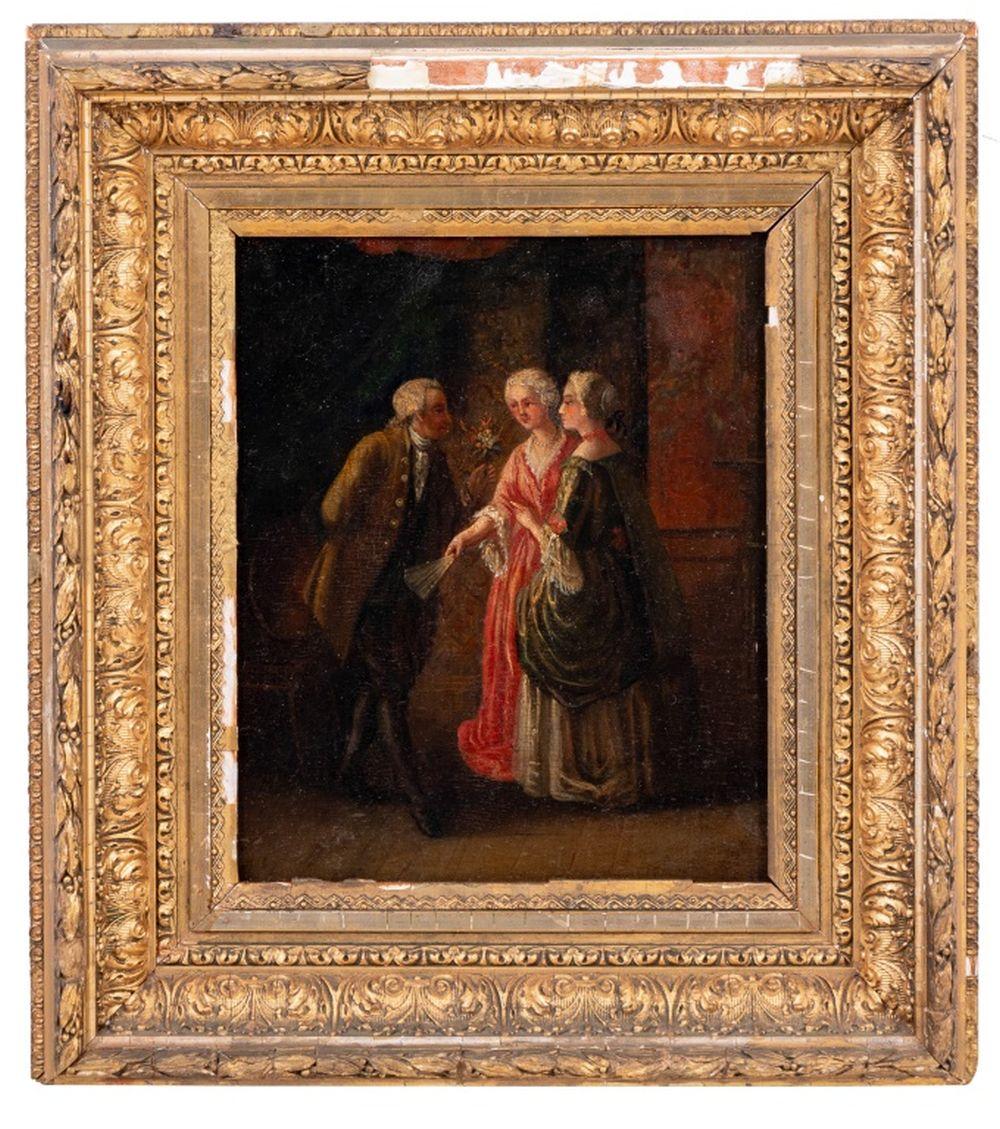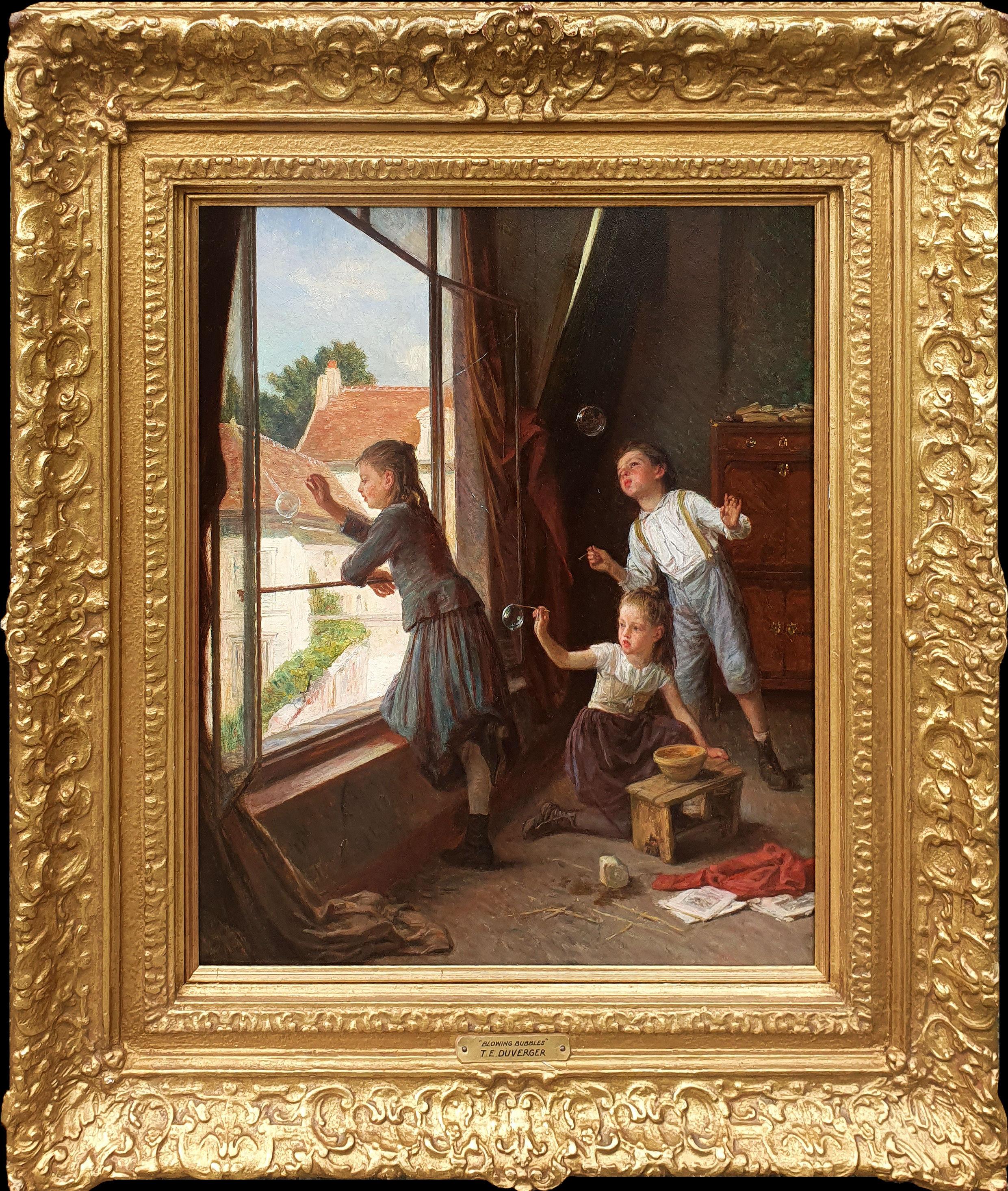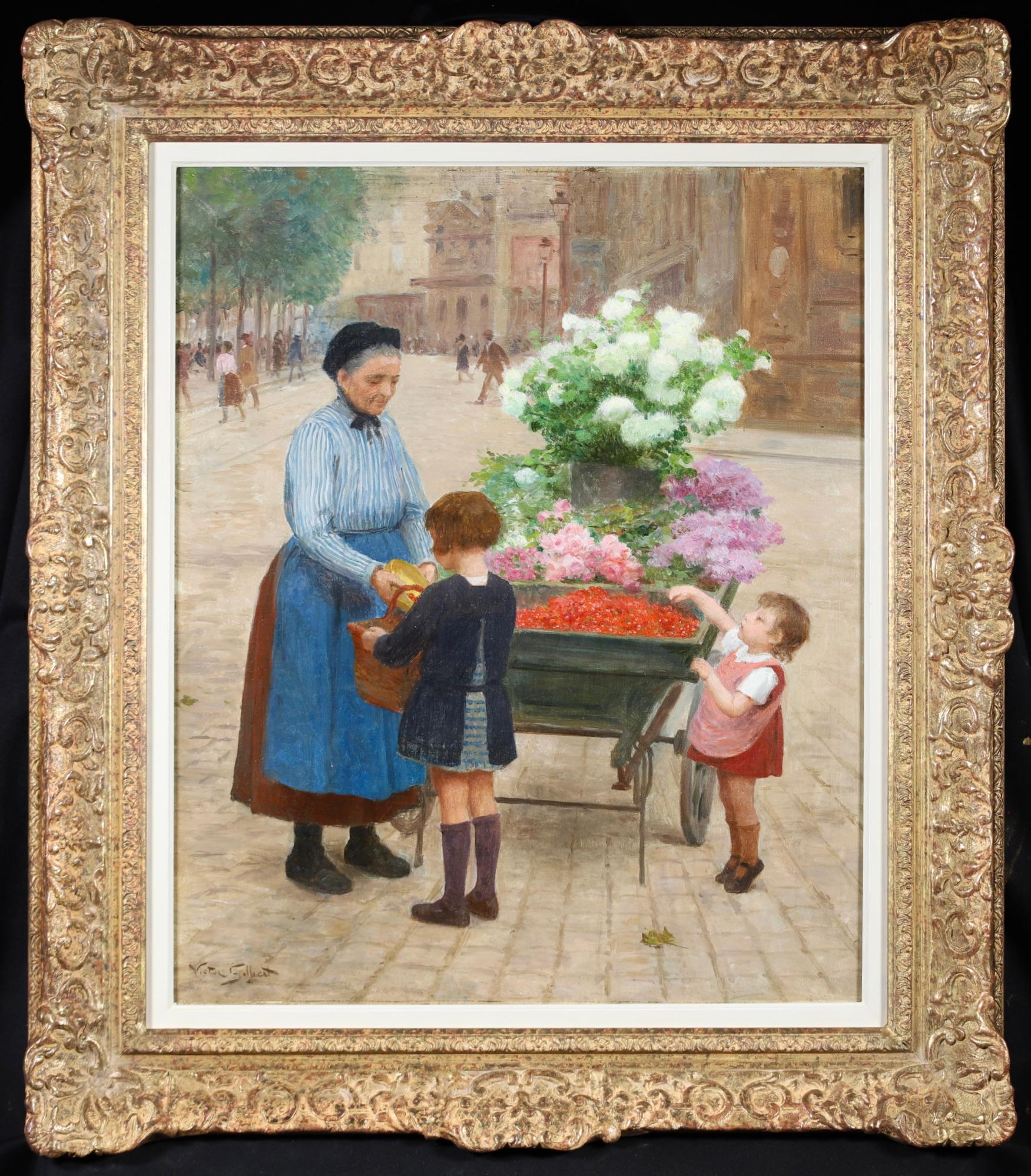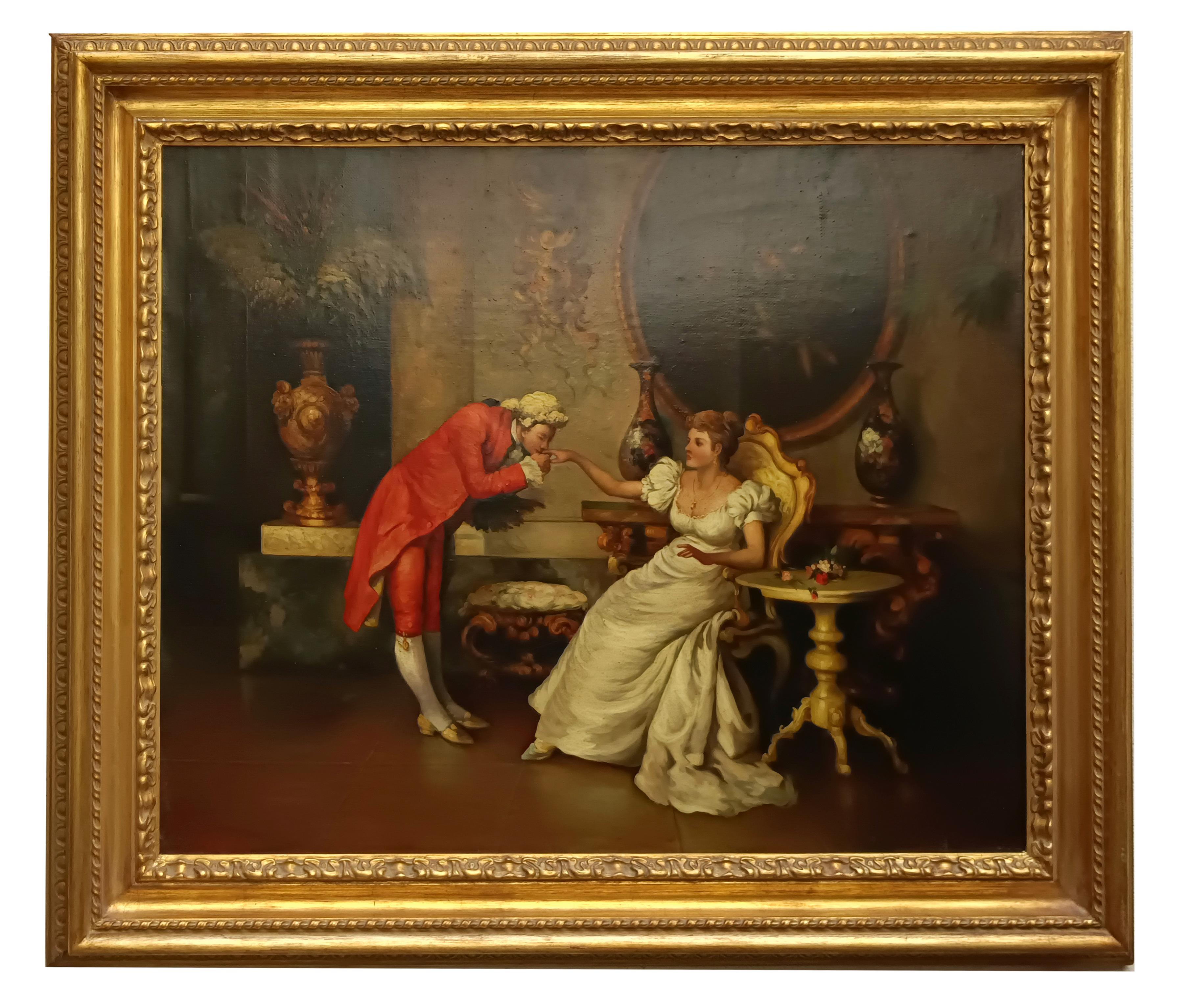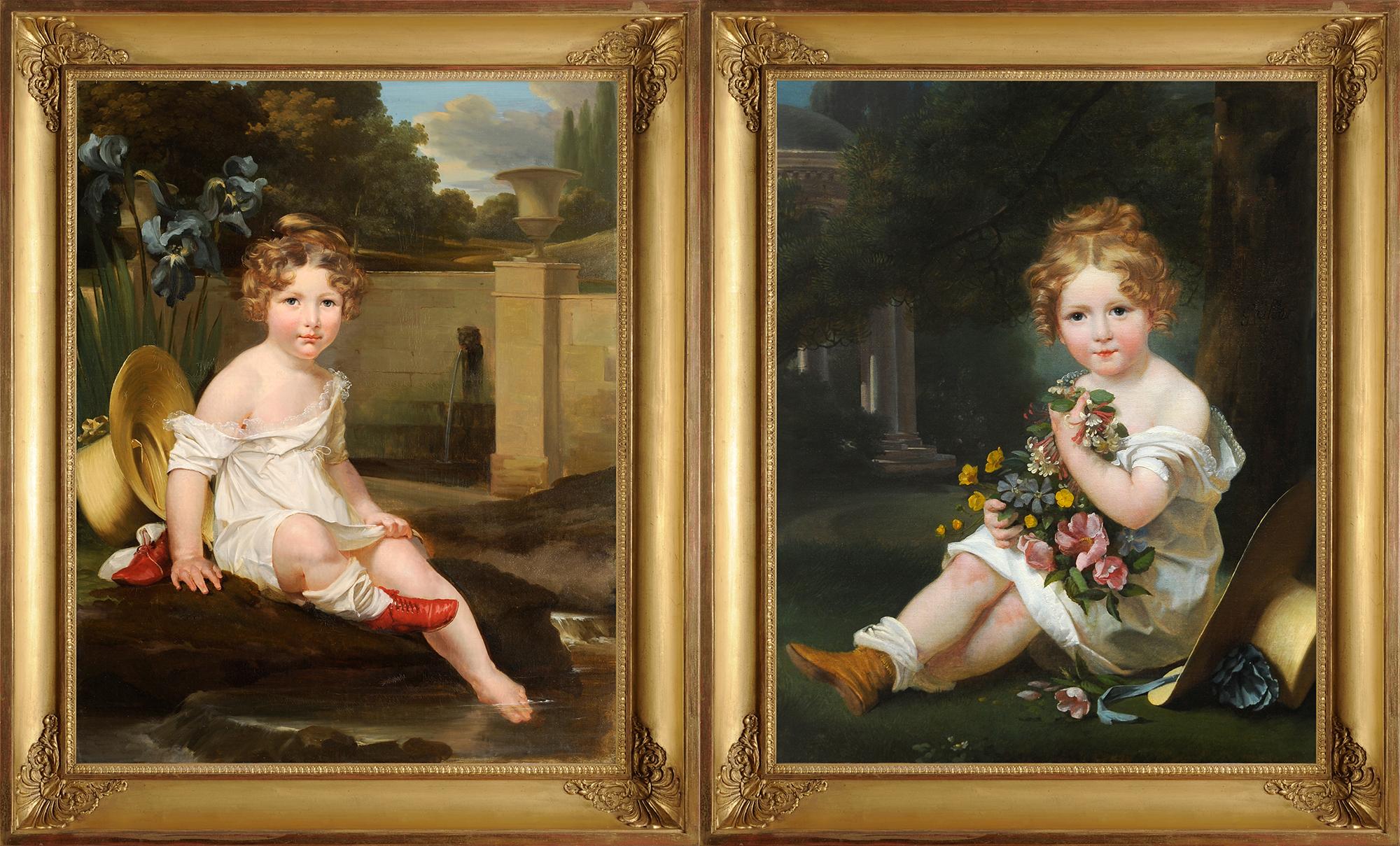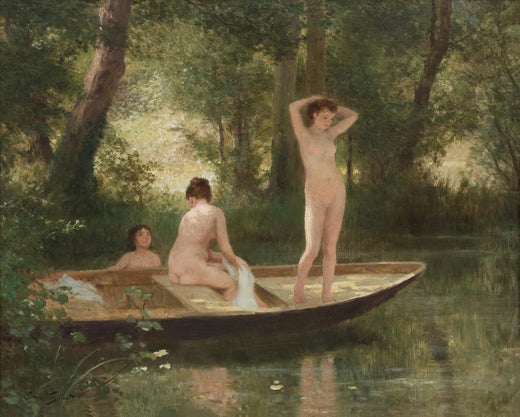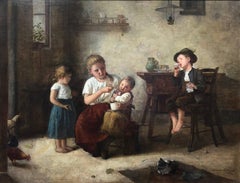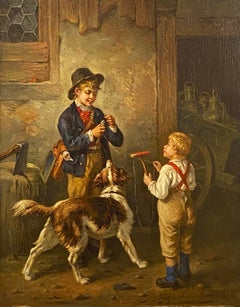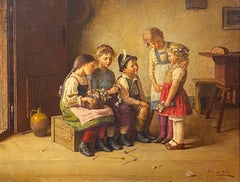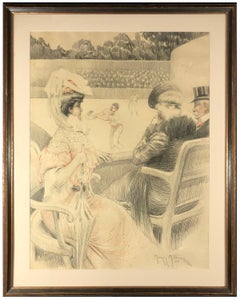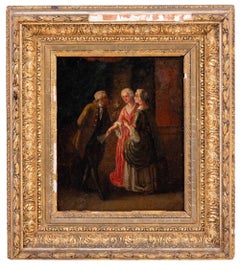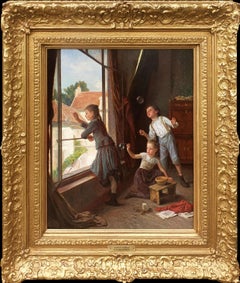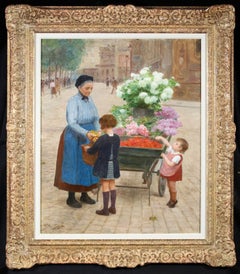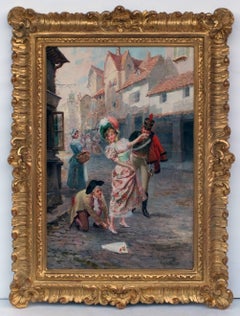Items Similar to Sharing Bon-Bons
Want more images or videos?
Request additional images or videos from the seller
1 of 6
Victor Gabriel GilbertSharing Bon-BonsEarly 20th Century
Early 20th Century
Price Upon Request
Price Upon Request
Price Upon Request
Price Upon Request
Price Upon Request
Price Upon Request
Price Upon Request
Price Upon Request
Price Upon Request
Price Upon Request
About the Item
Early 20th Century Oil Painting by Victor Gilbert. Canvas dimensions 14.75 x 18 inches. Framed dimensions 22 x 25 inches.
Born Paris, France 1847; Died 1933
Victor Gilbert's natural ability as an artist was recognized early, but his family lacked the financial resources to send the young man to the École des Beaux-Arts. Rather than enrolling in the École, Gilbert was apprenticed to Eugene Adam as an artisan painter and decorator. His only formal education was evening classes with Pierre Levasseur at the École de la ville de Paris.
Perhaps it was his early immersion into la vie quotidienne that formed the basis for his later choices of subject matter for his art, that of the markets and streets of Paris.
Despite his lack of formal training, Gilbert's admissions to the Paris Salons of 1873 and 1874 were very well received by audiences and critics alike; at this time he was supported by the dealer Paul Martin, who was an important proponent of the Impressionist movement.
Gilbert emerged in the early 1880s as the primary Realist painter to record the French marketplace. He achieved considerable success, while firmly establishing his reputation, at the 1880 Salon when he obtained a second-class medal, critical acclaim and a state purchase for his painting entitled A Corner of the Fish Market, Morning.
His oeuvre is punctuated with very large canvases depicting the various sections of the largest marketplace in Paris, Les Halles. His painting styles encompassed both the naturalist manner of the late nineteenth century and the vibrant technique of plein-air light and brushwork that emerged in his paintings of the early twentieth century.
He was honored with a gold medal in 1889 and the Bonnat Prize in 1926. His reputation was confirmed by his nomination to the Legion d'Honneur in 1897.
- Creator:Victor Gabriel Gilbert (1847-1933, French)
- Creation Year:Early 20th Century
- Dimensions:Height: 14.75 in (37.47 cm)Width: 18 in (45.72 cm)Depth: 1 in (2.54 cm)
- Medium:
- Movement & Style:
- Period:
- Condition:
- Gallery Location:Missouri, MO
- Reference Number:1stDibs: LU74739265822
Victor Gabriel Gilbert
Victor Gilbert's natural ability as an artist was recognized early, but his family lacked the financial resources to send the young man to the École des Beaux-Arts. Rather than enrolling in the École, Gilbert was apprenticed to Eugene Adam as an artisan painter and decorator. His only formal education was evening classes with Pierre Levasseur at the École de la ville de Paris. Perhaps it was his early immersion into la vie quotidienne that formed the basis for his later choices of subject matter for his art, that of the markets and streets of Paris. Despite his lack of formal training, Gilbert's admissions to the Paris Salons of 1873 and 1874 were very well received by audiences and critics alike; at this time he was supported by the dealer Paul Martin, who was an important proponent of the Impressionist movement. Gilbert emerged in the early 1880s as the primary Realist painter to record the French marketplace. He achieved considerable success, while firmly establishing his reputation, at the 1880 Salon when he obtained a second-class medal, critical acclaim and a state purchase for his painting entitled A Corner of the Fish Market, Morning. His oeuvre is punctuated with very large canvases depicting the various sections of the largest marketplace in Paris, Les Halles. His painting styles encompassed both the naturalist manner of the late nineteenth century and the vibrant technique of plein-air light and brushwork that emerged in his paintings of the early twentieth century. He was honored with a gold medal in 1889 and the Bonnat Prize in 1926. His reputation was confirmed by his nomination to the Legion d'Honneur in 1897.
About the Seller
5.0
Vetted Professional Seller
Every seller passes strict standards for authenticity and reliability
Established in 1970
1stDibs seller since 2017
155 sales on 1stDibs
Typical response time: Several days
- ShippingRetrieving quote...Shipping from: Missouri, MO
- Return Policy
Authenticity Guarantee
In the unlikely event there’s an issue with an item’s authenticity, contact us within 1 year for a full refund. DetailsMoney-Back Guarantee
If your item is not as described, is damaged in transit, or does not arrive, contact us within 7 days for a full refund. Details24-Hour Cancellation
You have a 24-hour grace period in which to reconsider your purchase, with no questions asked.Vetted Professional Sellers
Our world-class sellers must adhere to strict standards for service and quality, maintaining the integrity of our listings.Price-Match Guarantee
If you find that a seller listed the same item for a lower price elsewhere, we’ll match it.Trusted Global Delivery
Our best-in-class carrier network provides specialized shipping options worldwide, including custom delivery.More From This Seller
View AllBlowing Bubbles
By Edmund Adler
Located in Missouri, MO
Edmund Adler (Rode)
"Blowing Bubbles"
Oil on Canvas
22 x 27 inches
32 x 37 inches framed
Signed Lower Right
Edmund Adler (Austrian) 1876-1965
Kno...
Category
1920s Realist Figurative Paintings
Materials
Canvas, Oil
Price Upon Request
Readying for Play
Located in Missouri, MO
Framed Size: 25.5 x 23 inches
Joseph Gyselinckx was born in 1817. He was a genre painter in Antwerp. The artist was a student of F. de Brakeleer. He had two paintings included in ...
Category
Late 19th Century Realist Figurative Paintings
Materials
Canvas, Oil
Price Upon Request
Presenting the Bouquet
By Edmund Adler
Located in Missouri, MO
Canvas Size: approx. 22 x 27 inches
Framed Size: approx. 29 x 34 inches
Edmund Adler (Austrian) 1876-1965
Known for his naturalness in color and expression, the artist Edmund...
Category
Early 20th Century Realist Figurative Paintings
Materials
Canvas, Oil
Price Upon Request
A Close Competition
By Maurice Milliere
Located in Missouri, MO
Maurice Milliere (1871-1946)
"A Close Competition" 1905
Colored Pencil on Paper
Signed and Dated Lower Left
Site: approx. 35 x 36 inches
Framed: approx. 43 x 35 inches
Born at Le Havre in Normandy on 12th December 1871, Millière began his art education in his home town but soon transferred to l'Ecole des Beaux-Arts in Paris, where he studied portraiture, life drawing and figure painting in the atelier of Leon Bonnat, whose pupils included Toulouse-Lautrec and Raoul Dufy. He also studied at l'Ecole des Arts Decoratifs. His skill as a draughtsman translated quickly into success as a cartoonist and illustrator and his brilliant interpretation of the "Modern Parisienne" soon became known as the "Petite femme...
Category
Early 1900s Art Nouveau Figurative Drawings and Watercolors
Materials
Paper, Color Pencil
Price Upon Request
The Reading Lesson
By Bernard Pothast
Located in Missouri, MO
Bernard Pothast
"The Reading Lesson"
Oil on Canvas
Signed Lower Right
25 x 30 inches
30.5 x 35.5 inches framed
Born in Belgium, Bernard Pothast travel...
Category
Late 19th Century Dutch School Figurative Paintings
Materials
Canvas, Oil
Price Upon Request
An Opulent Evening
By Guiseppe Aureli
Located in Missouri, MO
Guiseppe Aureli (1858-1929)
"An Opulent Evening" c. 1880s
Watercolor on Paper
Signed Lower Right
Site Size: approx. 30 x 20 inches
Framed Size: approx. 37 x 29 inches
Giuseppe Aureli (December 5, 1858 in Rome – 1929) was an Italian painter and watercolorist. His work is noted for its historical subject matter, portraits of Italian noble families as well as genre paintings and local scenes, especially work with Oriental themes.
He received his early art education at the Academia de San Luca where he was the pupil of Pietro Gabarini and Cesare Maccari.[1] He exhibited in various exhibitions; including: The International Exhibition of 1888 in Munich and the World Fair of 1893 in Chicago, but his Oriental works were rarely included in these early exhibitions. Having his workshop at 48 Via Margutta in Rome, Aureli was in a position to exchange ideas with the most prolific Orientalist artists at that the time. He used the same staircase that led to a rabbit-warren of studios including those of Filippo Bartolini, Enrico Tarenghi...
Category
Late 19th Century Victorian Figurative Drawings and Watercolors
Materials
Watercolor, Laid Paper
Price Upon Request
You May Also Like
French School "The Proposal", 19th C.
Located in Astoria, NY
French School, "The Proposal", Oil on Oak Panel, 19th century, depicting a gentleman presenting a bouquet of flowers to a young lady and her chaperone, unsigned, giltwood frame. Imag...
Category
19th Century French School Figurative Paintings
Materials
Oil, Panel
Blowing Bubbles
By Théophile Emmanuel Duverger
Located in Belgravia, London, London
Oil on panel
Panel size: 21.5 x 17.25 inches
Signed??
Category
19th Century Figurative Paintings
Materials
Oil, Panel
La Marchande de Fleurs - French Realist Figurative Oil by Victor Gilbert
By Victor Gabriel Gilbert
Located in Marlow, Buckinghamshire
Signed figurative oil on original canvas by French realist painter Victor Gabriel Gilbert. The work shows a flower seller filling a young girl's basket with cherries while a little b...
Category
1910s Realist Figurative Paintings
Materials
Canvas, Oil
Alonso PEREZ - Painting Genre Scene in Paris
By Alonso Perez
Located in Saint-Ouen, FR
ALONSO PEREZ (1881 - 1914)
Lady and Napoleon Soldier in the Street
Oil on canvas signed and dated 1906 low right
Dedication : Au sympathique maître et...
Category
Early 19th Century Academic Portrait Paintings
Materials
Oil
ROMANTIC SCENE - French School - Oil on Canvas Italian Figurative Painting
By Salvatore Testa
Located in Napoli, IT
Romantic Scene - Oil on canvas cm.80x100, Salvatore Testa, Italy, 2008
The painting by Salvatore Testa depicts a beautiful courting scene, the painting is inspired by the French Sch...
Category
Early 2000s French School Figurative Paintings
Materials
Canvas, Oil
Portraits of two sisters
Located in BELEYMAS, FR
Bernard GAILLOT
(Versailles 1780 – Paris, 1847)
Portraits of two sisters
Pair of oil on canvas
H. 92 cm; L. 73 cm
One signed
Student of David, he presented his first works at the Sa...
Category
1810s French School Portrait Paintings
Materials
Canvas, Oil
